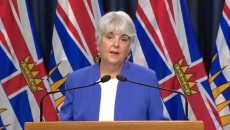Canadian Blood Services says the resumption of elective surgeries following months of COVID-19 lockdown is putting a worrisome drain on the national blood supply.
The number of donors that can be accepted at blood clinics is limited to respect physical-distancing restrictions.
Donations had initially dropped about 20 per cent because of concerns about the novel coronavirus and, with the suspension of elective surgeries, the demand for blood was down about 15 per cent.
The agency has been able to keep pace with demand until now.
"It's a return to a new normal," said Peter MacDonald, director of donor relations.
"What we've seen in the last couple of weeks is hospital demand has started to return to pre-COVID levels with the restrictions being lifted as provinces have started to open up. There's now a backlog of elective surgeries that might require blood and blood products."
About 400,000 of Canada's 37 million residents give blood on a regular basis.
Canadian Blood Services operates a national inventory that allows products to be regularly shifted around the country to meet hospital and patient needs.
But the inventory has a shelf life — a year for frozen plasma, 42 days for red blood cells and five days for platelets — so the supply is no longer meeting demand.
MacDonald said O-negative blood is already showing a shortage with other types not far behind.
"We're starting this week with a little over 18,000 units in the national inventory and our goal is to run it with between 20,000 and 24,000. We're a little under right now."
MacDonald is hoping a return to more mobile clinics across the country beginning in July, including in some communities where they were cancelled, will help with the shortage.
But with Canadians returning to everyday life, he's worried they might not be as keen on donating blood.
"It is a concern. When the message went out in mid-March our attendance rates improved. It was one of the few things you could do in public, a way to make a difference in your community and we weren't competing with a lot of other options," he said.
"There's a concern that as the weather warms up and the communities and provinces open up again that we could see an increase in our no-shows or cancellations for our appointments."
It's National Donor Week and MacDonald hopes people will keep giving before the situation gets any worse.
"It's important to get the message out in advance of the inventory dipping to any dangerous levels."






